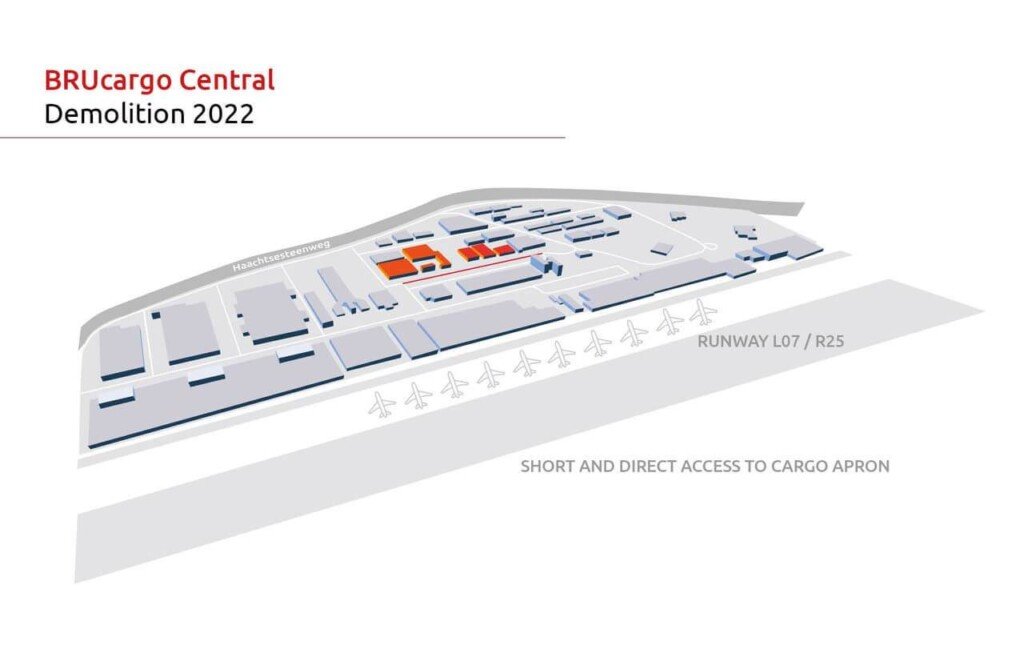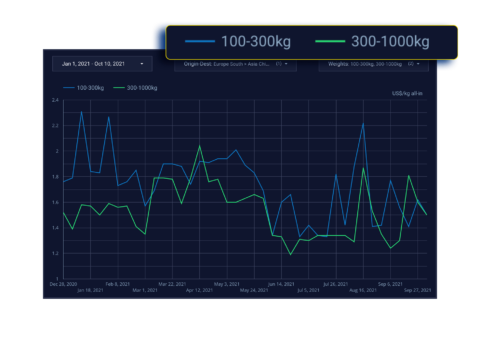Since more than a decade, Brussels Airport cargo activities experience a strong and sustainable growth of air cargo volumes, particularly with the rising importance of pharmaceutical transport, e-commerce and perishables.
The development of the Brussels Airport cargo area is one of the priorities of the airport’s new Shift 2027 strategy.
As a proactive investor, together with its cargo community, Brussels Airport is joining forces to make the logistics chain at the airport even more efficient and to accommodate future growth.
Brussels Airport accommodates this evolution by redeveloping part of its cargo area in a sustainable manner.
As such, to meet the growing demand for storage and handling space, and given the need to modernise several buildings, Brussels Airport will invest 70 million euros over the next three years to redevelop a large area located in the heart of the cargo activities.
Redevelopment project
Between 2022 and 2025, eight end-of-life buildings will be demolished in the Brussels Airport cargo zone and three new logistics buildings including office facilities and a parking tower will be developed. The new buildings will be future proof, meeting the net-zero carbon ambitions of Brussels Airport. The mobility layout will be revised to ensure smooth traffic flow with thorough renovation of existing roads and improved modal split.
Demolition work on the eight ageing buildings will start in June 2022, while construction work is expected to start at the end of 2023. Construction is scheduled to be completed by 2025.
After the development of Brucargo West, the new Animal Care and Inspection Centre two years ago, and the new Swissport Cargo building, the development of the cargo area is thus continued in order to meet the growing demand for capacity. Approximately 83,500 sq mt area is being redeveloped, located in the second line of access to the tarmac. The demolition of the eight obsolete buildings in this area will start in the next few days, the construction works are scheduled to start at the end of 2023.

“Accelerating the development of the cargo zone is one of the priorities within the new strategy of Brussels Airport.,” points out Arnaud Feist, CEO of Brussels Airport Company. “We want to further strengthen our position as a global cargo hub and develop the cargo area in a sustainable way in order to offer our logistics partners the most efficient infrastructure and operational processes.”
Improve land efficiency and spatial quality
The redevelopment of the cargo zone will result in increased efficiency in land use, creating extra capacity for local logistics partners. This is a first step in structural redevelopment to meet rising demand for additional logistical space with minimal impact for the local environment. The redevelopment will also improve the spatial quality of cargo area creating a sustainable work environment.
Improve traffic circulation for all users
The Brucargo Central redevelopment will improve traffic circulation to address existing operational issues, resolving dangerous points and improving flows. The new mobility layout will improve the safety and mobility of vulnerable road users. During the works the circulation will be adapted to allow continued traffic and limit traffic disruptions as much as possible.
“Our cargo activities are growing steadily and our cargo area is constantly developing,” said Feist.
“The demand from current and future partners for storage and handling capacity is very high. Even if the cargo area of Brussels Airport is already very large, it is important to rethink and reorganise the spaces for more efficiency, but also and especially to modernise them. Sustainability plays a key role in this modernisation. Brussels Airport wants to improve the energy efficiency of its entire infrastructure, a strategy that applies far beyond the cargo area.”
In 2021, 843,000 tonnes of cargo transited through Brussels Airport. These increasing volumes (+30% compared to 2020) clearly demonstrate the growing interest in air cargo transport, which was strengthened during the COVID crisis in the areas of pharmaceuticals and e-commerce. As an essential platform for the worldwide transport of vaccines, Brussels Airport has played and still plays a crucial role in the fight against COVID. But that’s not all. Brussels Airport offers a premium cargo platform, with state-of-the-art infrastructure, an extensive network and customer-focused technology, focusing on four areas of expertise: e-commerce, perishables, live animals and pharmaceuticals. To meet this high demand, Brussels Airport’s cargo zone consists of a large surface area of 130 hectares and no less than 380,000 sq mt of warehouses.
With this major investment in Brucargo Central, Brussels Airport is strengthening its crucial position as the second most important economic hub in Belgium.







